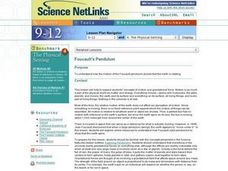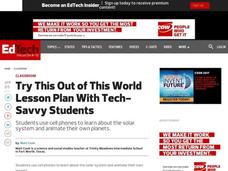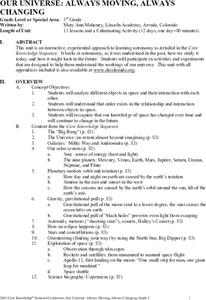Curated OER
Science Crossword Puzzle
Class members read 25 clues about all areas of science, including biology, chemistry, weather, physical science, and insert their answers into a crossword puzzle. There is no word bank and the students would need experience with tough...
Curated OER
Conic Sections Applications and Properties
In this algebra worksheet, 11th graders graph parabolas and figure out the major axis and minor axis of the graph. They also find the focus. There are 4 problems on this worksheet.
Curated OER
Foucault's Pendulum
Young scholars investigate how the motion of the Foucault pendulum proves that the Earth is rotating. They research the Internet about pendulums and conduct an experiment online. They view a multimedia presentation about pendulums and...
Curated OER
Astronomy with a Stick
Students describe the movement of the Earth as it relates to the sun and
formulate a hypothesis for the movement and the changing length of the shadow. They express the relationship between the sun and the Earth and how that causes the...
Curated OER
Out of This World
Fifth graders animate their own planets. In this solar system lesson, 5th graders use smartphones and the software, GoKnow Sketchy, to create images for presentations on their created planets that appear to be animated when played...
Curated OER
Bellwork Week 20-Space Science
In this space worksheet, students answer questions about the size comparison of the moon, Earth, Solar System, Virgo Cluster, Milky Way Galaxy, and Universe, they answer questions about the Milky Way Galaxy and they sketch the life cycle...
Curated OER
Our Universe: Always Moving, Always Changing
Students explore the main concepts of astronomy through the eleven lessons of this unit. The past, present, and future methods of studying the science are examined in this unit.
Curated OER
Astronomy
Students explore the rotation of the Earth and observe the shapes of constellations. After discussing how the Earth moves. volunteers use a flashlight and globe to model the movement of the sun-Earth system. Using Digitalis technology,...
Curated OER
As the World Turns
Learners will use their bodies to act out the motions of Earth by exploring orbits, rotations, and the turning of the earth as it revolves around the sun. Doing research to find correct answers to their questions will help them act out...
Curated OER
Modeling the Seasons
Students explore the seasons and their attributes. In this geography lesson, students create a 3-D model of the Earth that showcases the elliptical travel of the Earth that causes seasons.
Curated OER
Charting Seasonal Changes
Students research the Earth's patterns of rotation and revolution, create a chart and graph of these patterns and use them to explain the causes of night and day and summer and winter.
Curated OER
Our Solar System
Students analyze the theories of the formation of the universe and solar system. Students analyze planetary motion and the physical laws that explain that motion: Rotation, Revolution, Apparent diurnal motions of the stars, sun, and...
Curated OER
Space Science: Constellations and the Sun
Students review the zodiac signs and illustrate their movement using constellations on the wall and themselves to represent earth. Individually or in groups, they stand in the center of the room while a shadeless lamp is placed between...
Curated OER
It's Gettin' Hot In Here, So Transfer Energy
Young scholars study the means by which energy is transferred from the sun through the Earth's atmosphere. They examine radiation, conduction, and convection. They complete a lab to determine how the different transfers affect the...
Curated OER
Seasons of the Year
Students examine how the link between the tilt of the Earth's axis to the ecliptic and seasons of the year--length of day, effectiveness of sunlight, polar day and night, and seasons south and north of the equator, as well as near it.
Curated OER
As the World Turns
Third graders read books and participate in class discussions about the motion of the stars and planets and moons in relation to the Earth. In small groups, 3rd graders act out these movements to music.
Curated OER
The Celestial Sphere
Students are introduced to the celestial sphere, describing its apparent rotation and the special role of the pole star.
Curated OER
The Seasons
Students determine the effect of the earth's tilt on the amount of incoming solar radiation throughout the year. They simulate the earth's orbit around the sun using a light bulb and a globe to simulate the seasons. Assessment questions...
Curated OER
Observing Motion
First graders explore movement and motion. For this motion lesson, 1st graders how objects can move as well as how the Earth is in constant motion and the force of gravity. Students complete a coloring sheet.
Bowels Physics
Methods of Motion
How could you earn a $6,000,000 speeding ticket? This presentation uses an analogy that relates speed in the universe to the cost of a speeding ticket. Scholars ultimately understand that motion is relative. Also covered is the...
Curated OER
The Solstices
Compare surface temperatures when the solstice occurs in the different hemispheres. Young scientists draw conclusions from their investigation of data collected using spreadsheets and a globe.
Curated OER
The Reason for the Seasons
Students compare graphs of their data that was generated on a NASA website. In this seasons lesson students complete a lab activity.
Curated OER
True North, Magnetic North
Young scholars explain why compass angles need to be corrected for regional magnetic variation. They observe the difference between magnetic and true north. Each student measures the angle of variation for a town in a different state.
It's About Time
A Moving Frame of Reference
We often remind pupils to cite their references, but this lesson helps them understand there are many frames of reference. Scholars experiment with throwing a ball straight up in the air and catching it. Then they must do it again...

























